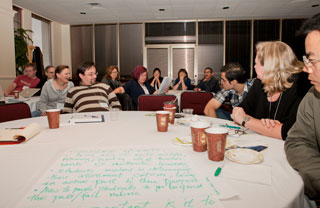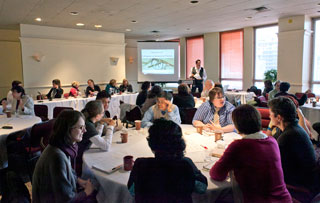Re-examining assessment
An enthusiastic crowd of over 100 people attended a recent colloquium at Concordia on effective assessment practices, organized by Arshad Ahmad, an associate professor of finance in the John Molson School of Business, and president of the Society for Teaching and Learning in Higher Education.

“It was a long shot to expect colleagues to spend six hours exploring one teaching topic during the middle of the semester on such short notice, but the turnout of more than 100 was overwhelming,” Ahmad said.
The group of participants included more than 20 Concordia graduate students from all disciplines, teachers from Dawson, John Abbott and Champlain colleges, and professors from Concordia, McGill, and the Université de Montréal. In education, the term assessment broadly refers to the process of collecting and interpreting information to inform students of their progress, and to inform various personnel who make educational decisions.
The aim of the colloquium was two-fold: to generate discussion around the topic of assessment and to develop practices to improve teaching and learning. The response from the Concordia graduate students in attendance was very positive, many of them saying they valued the opportunity to hear from instructors with years of teaching behind them.
“I want to be a professor, and so trading knowledge and information with all these people who are so much more experienced than I am was really rewarding,” said Sarah Livesey, a first-year graduate student and teaching assistant in Concordia’s Department of English. Livesey said it was encouraging to see that even seasoned professors struggle with some of the same issues she has encountered in the short time she has been assessing students.

“It can be really difficult to create assessment tasks that will be meaningful for the whole class, so talking through these difficulties together with a group of really knowledgeable people was really helpful.
The day began with a keynote address by Lesley-Jane Eales-Reynolds, director of learning, teaching and pedagogic research at the University of Westminster. The attendees then divided into groups to come up with questions to ask the eight-member panel of assessment experts. “The panel of eight experts, some from Australia, Hong Kong and the U.K., could have easily dominated the colloquium,” Ahmad said. “But we had designed the event for participant interaction and that is what happened.”
The comments from the instructors, not on the panel, were likewise applauded and expanded upon by other members of the crowd. Advice, queries, and even heated debate over certain issues kept everyone in the room involved right up until closing comments by panel members.
Livesey says she was particularly impressed by an assessment practice described by panelist Diane Bateman, an English teacher at Champlain College in St. Lambert. The practice involves students handing in early drafts of essays for feedback from the professor before handing in a final copy to be marked. If the professor gives the student a green light to go ahead and revise the essay as needed, the student can skip the next class. If the student receives a red light, though, he or she must attend the next class for further instruction. Bateman, who is an assessment specialist, said her students came up with the idea when they were given a case study on assessment. She described the practice as one that has revolutionized her approach to assessment.
“[Normally] the grade goes in, they put that in a drawer and they don’t take it out when they write the next assignment. So for the first time in my life, I feel like I’m putting my marking in a spot where they’re going to take it and apply it. There’s great joy in that.”

Livesey said Bateman’s formative assessment practice seems like it would be something she herself could use when grading her own students. “Being able to divert my attention more efficiently I think is a great strategy.”
Bateman said participating on the panel was a great opportunity to share some of the experience she has garnered over her many years as a researcher and teacher. “I’ve made peace with a lot of these issues that people have not made peace with yet. I can really appreciate the angst that they feel, which is why I think helping them to cope, and make decisions, and embed them into the curriculum in a more positive way, is a good role for me now.”
At the end of the day, Ahmad asked the participants to write a “postcard” describing what they got out of the day, and then asked them to read their thoughts out loud. “I learned that assessment is only limited by the innovativeness of the assessor — that it is a joyful, integral part of the teaching and learning process,” said one participant.
“I’ll certainly look at the assessment process in a different light after today,” said another.
“It’s rejuvenating and rewarding for me to learn from people who share my passion for teaching,” added another.
Tarek El Masri, a PhD student in accounting who hopes to become a university professor one day, was equally effusive in his praise for the event. “Having the opportunity to be present today among these experienced, knowledgeable teachers was so enlightening for me,” he said.
Ahmad and his organizing team of graduate students will try to compile the notes taken during the colloquium into a publication. He said most of the participants are enthusiastic about staying in touch and continuing to share their ideas on teaching and assessment. “This event is testimony that faculty are very eager to talk about teaching issues that matter. Assessment is one such issue!”
Related links:
• Centre for Teaching and Learning Services
• Society for Teaching and Learning in Higher Education